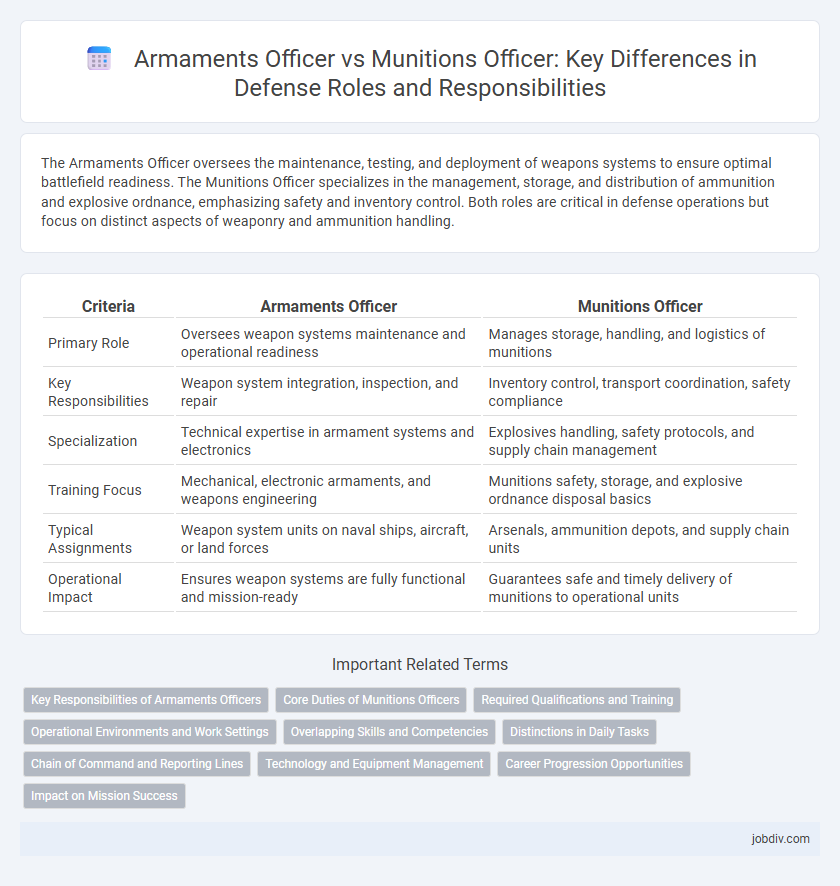The Armaments Officer oversees the maintenance, testing, and deployment of weapons systems to ensure optimal battlefield readiness. The Munitions Officer specializes in the management, storage, and distribution of ammunition and explosive ordnance, emphasizing safety and inventory control. Both roles are critical in defense operations but focus on distinct aspects of weaponry and ammunition handling.
Table of Comparison
| Criteria | Armaments Officer | Munitions Officer |
|---|---|---|
| Primary Role | Oversees weapon systems maintenance and operational readiness | Manages storage, handling, and logistics of munitions |
| Key Responsibilities | Weapon system integration, inspection, and repair | Inventory control, transport coordination, safety compliance |
| Specialization | Technical expertise in armament systems and electronics | Explosives handling, safety protocols, and supply chain management |
| Training Focus | Mechanical, electronic armaments, and weapons engineering | Munitions safety, storage, and explosive ordnance disposal basics |
| Typical Assignments | Weapon system units on naval ships, aircraft, or land forces | Arsenals, ammunition depots, and supply chain units |
| Operational Impact | Ensures weapon systems are fully functional and mission-ready | Guarantees safe and timely delivery of munitions to operational units |
Key Responsibilities of Armaments Officers
Armaments Officers specialize in the maintenance, serviceability, and operational readiness of aircraft weapon systems, ensuring all armaments meet safety and performance standards. They oversee the inspection, storage, and safe handling of weapons, coordinating with munitions officers to integrate armaments with munitions supply. Their key responsibilities include conducting technical assessments, managing defect reporting, and providing expert advice on weapon system capabilities and limitations.
Core Duties of Munitions Officers
Munitions Officers oversee the management, storage, and deployment of explosives and ammunition, ensuring safety protocols and compliance with military regulations. They coordinate inventory control, conduct inspections, and supervise ordnance handling training to maintain operational readiness. Their expertise extends to the disposal of unexploded ordnance and advising commanders on munitions capabilities and limitations in combat scenarios.
Required Qualifications and Training
An Armaments Officer requires specialized training in weapon systems management, ballistic theory, and tactical deployment, often completion of a military weapons systems course. Munitions Officers must possess qualifications in explosives handling, safety protocols, and ordnance logistics, typically including certification in munitions maintenance and storage. Both roles demand rigorous physical fitness standards, security clearances, and continuous professional military education to maintain operational readiness.
Operational Environments and Work Settings
Armaments Officers primarily operate in dynamic combat zones and aboard naval vessels, overseeing weapon systems integration, maintenance, and deployment to ensure operational readiness in high-intensity environments. Munitions Officers are typically stationed at logistics hubs, airbases, or ammunition depots, specializing in the storage, handling, and distribution of explosives and ordnance under stringent safety protocols. Both roles require adaptation to diverse military settings, but Armaments Officers focus more on frontline tactical support while Munitions Officers emphasize backend supply chain and ordnance lifecycle management.
Overlapping Skills and Competencies
Armaments Officers and Munitions Officers both require expertise in weapons systems, explosives handling, and safety protocols to ensure operational readiness and tactical effectiveness. Proficiency in logistics management, technical maintenance, and threat assessment is essential for both roles to maintain the integrity and functionality of armaments and munitions. Strong analytical skills and knowledge of military regulations underpin their ability to coordinate complex defense operations involving armament deployment and munitions supply chains.
Distinctions in Daily Tasks
An Armaments Officer is primarily responsible for the inspection, maintenance, and operational readiness of weapon systems, ensuring that all armaments on military equipment function correctly and safely. In contrast, a Munitions Officer manages the storage, handling, and distribution of ammunition, overseeing inventory control and compliance with safety protocols during transportation and deployment. The Armaments Officer's daily tasks emphasize technical expertise on weapon systems, while the Munitions Officer focuses on logistics and safety management related to munitions.
Chain of Command and Reporting Lines
An Armaments Officer typically oversees the maintenance, storage, and deployment of weapon systems, reporting directly to the weapons or operations branch leadership within the chain of command. A Munitions Officer focuses on the management, supply, and handling of ammunition and explosive devices, often reporting to logistics or ordnance units. Both roles maintain distinct but interrelated reporting lines to ensure operational readiness and compliance with safety protocols throughout the defense structure.
Technology and Equipment Management
Armaments Officers specialize in the maintenance, inspection, and deployment of weapon systems, ensuring optimal functionality of advanced defense technologies such as missile launchers and aircraft weaponry. Munitions Officers focus on the storage, handling, and safety protocols of explosives and ammunition, managing complex inventory systems and bomb disposal equipment. Both roles require expertise in cutting-edge technology for effective equipment management under stringent safety and operational standards.
Career Progression Opportunities
Armaments Officers typically advance through roles focused on weapon systems management, integrating technological expertise with tactical applications, leading to senior positions in weapons development and operational strategy. Munitions Officers progress through careers emphasizing the storage, maintenance, and deployment of explosives and ordnance, often moving into specialized logistics and safety leadership roles within defense supply chains. Both paths offer distinct trajectories: Armaments Officers align with platform-specific weapon innovations, while Munitions Officers specialize in lifecycle management and safety compliance of munitions.
Impact on Mission Success
Armaments Officers specialize in the maintenance, repair, and operational readiness of weapon systems, directly influencing mission success through ensuring optimal firepower and equipment reliability. Munitions Officers oversee the storage, handling, and deployment of ammunition, playing a critical role in mission support by managing ammunition availability and safety. Both roles are essential for mission effectiveness, with Armaments Officers ensuring weapon functionality and Munitions Officers guaranteeing ammunition supply security.
Armaments Officer vs Munitions Officer Infographic

 jobdiv.com
jobdiv.com